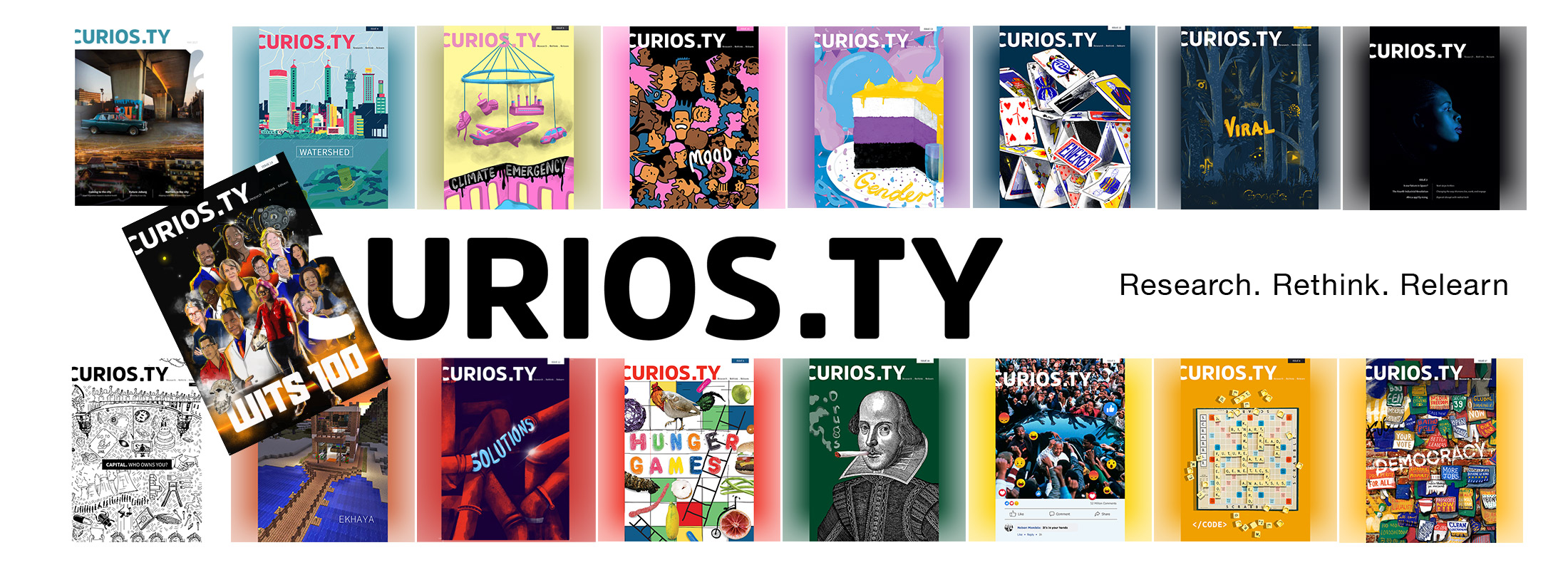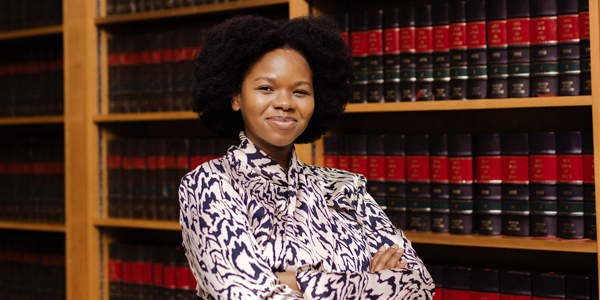
Finding ubuntu in the word of the law
- Leanne Rencken
Busisiwe Kamolane-Kgadima, the Acting Director at CALS is driven by human rights, and the fight for social justice.

Listening to Busisiwe Kamolane-Kgadima describe her journey from law student to newly appointed Acting Director at the Centre for Applied Legal Studies (CALS), you’d be mistaken for thinking it’s been easy – serendipitous, even. But when you probe a little deeper, you begin to understand how hard she’s worked to get to this point.
The metaphor that she uses to describe this journey is that of construction – building a future not just for herself, but for the country, for other black women, for the disadvantaged and unrepresented. This future is one that is carefully chosen, critically examined, one brick at a time.
While her Acting Director role was announced in February 2024, Kamolane-Kgadima has been at the Centre for five years. In this time, she completed her articles as well as her LLM at Wits University, launched and led the Research and Advocacy Unit, and served as Deputy Director before her most recent promotion.
Centred in human rights
Her current position is one of enormous responsibility, and she speaks of CALS as a living, breathing “tool of the law” that works across various aspects of human rights, fosters the advancement of social justice, including advocating for the protection of activists, and backs it all up with research and data collection.
While she has been involved in leading many projects under this framework, she is particularly passionate about CALS attracting students to the social justice sector: “We really believe in trying to get people out of the position that I, and many other students were in when we started our law studies, which is not knowing that human rights law presents a viable, impactful and fulfilling career opportunity and that human rights law can permeate all other areas of the law.”
It was in her fourth year as an LLB student at the University of Pretoria, where Kamolane-Kgadima had her epiphany. “Writing an essay about the South African ‘mud schools’ case study during a child law elective with Professor Ann Skelton, I suddenly realised that public-interest related work was exactly what I’d been looking for.”
This “Aha! moment” was critical in constructing Kamolane-Kgadima's future as a human rights lawyer and social justice activist, but looking back, she says that her personality had been pushing her in this direction from an early age.
“When I was trying to figure out my future career path, what was always important for me was that the work I chose to do had to make a positive impact in people’s lives,” she says. “In hindsight, I have always lived my life with this perspective in mind, but I also wanted it to be my career as well.”
Constitutionally speaking
Having completed her LLB degree at the University of Pretoria, Kamolane-Kgadima started her career as a legal intern and was later accepted into the coveted Constitutional Court law clerk programme. She describes her year clerking for Chief Justice Mogoeng as a conscientising and seminal experience.
“The experience and mentorship at the Constitutional Court was absolutely phenomenal. It gave me a deeper understanding of how the law can be used as a powerful tool to advance democracy and social justice. Working closely with the Chief Justice in conducting extensive research and writing judgments that have implications for the whole country, imprinted upon me a weight of responsibility to contribute to the building of our country and its constitutional democracy.”
Kamolane-Kgadima says that the career opportunities that have opened up for her also affirmed her belief that “everything happens the way it’s supposed to happen, to get you to where you are supposed to be”. While this may be true, it’s becoming clear in this interview just how strategic and determined she is, so I challenge her on this point, saying that it feels unjust to give fate all the credit.
Confidence through ubuntu
Smiling, she agrees: “You don’t get to where you are without people in your life to guide you, to believe in you, and to help put you in the right rooms. I have had the privilege of having many exceptional people play this role in my life. I’ve also learnt to bet on myself, to trust my gut and to seize opportunities and take risks.”
Her to-do list at CALS includes a stewardship that is cognisant of the present climate, that can forecast what is going to happen and is strategic in how it reacts and responds: “We are going into an election, for example, we have to be prepared to respond to various challenges that may arise while being proactive in seeking opportunities to advance our cause. We must consider things such as, if we end up with a coalition government, what does that look like? And what does that mean for the work that we're doing?”
CALS’ work involves holding the state and private entities accountable, shifting critical judgments from the theoretical into the implementation phase, capacitating state entities, partnering with grassroots movements in expanding their work, addressing historical and social injustices, and responding to rapidly changing situations both in this country and beyond our borders. “CALS has contributed a lot to the country, and will continue to do that, but there are so many lessons that we can learn from other African countries, and so much knowledge that we can give in return. Social justice and the kind of world we want to live in is not only tied to South Africa, but we also need to start focusing our attention on how we impact the rest of the continent, and the world,” she explains.
Towards a transformed future
She’s achieved a lot at the Centre already, knows it well and is pleased by the transformation signified by recent appointments.
“It's the first time that CALS has a black female director and an all-black female management team. It's interesting to see these changes happening and it means so much for the public interest sector and the legal profession. I don’t take it lightly, though, being here, showing other young black women that it’s possible, despite all the barriers that we face. I hope that my appointment is a spark that encourages others to pursue their dreams, and a challenge to the institutions whose leadership is still dominated by white males.”
As Kamolane-Kgadima has her eye squarely on CALS, it's a bit premature to ask what’s next, but she is willing to concede: “My utopia would be to see a world in which we make each other’s lives better, where doing things doesn’t come at the expense of another person or require the exploitation of marginalised people.”
- Leanne Rencken is a freelance writer.
- This article first appeared in Curiosity, a research magazine produced by Wits Communications and the Research Office.
- Read more in the 17th issue, themed: #Democracy, we turn to our academics and professional staff for their research, perspectives and commentary on both the progress and shortcomings in our democracy, and democracies elsewhere.

